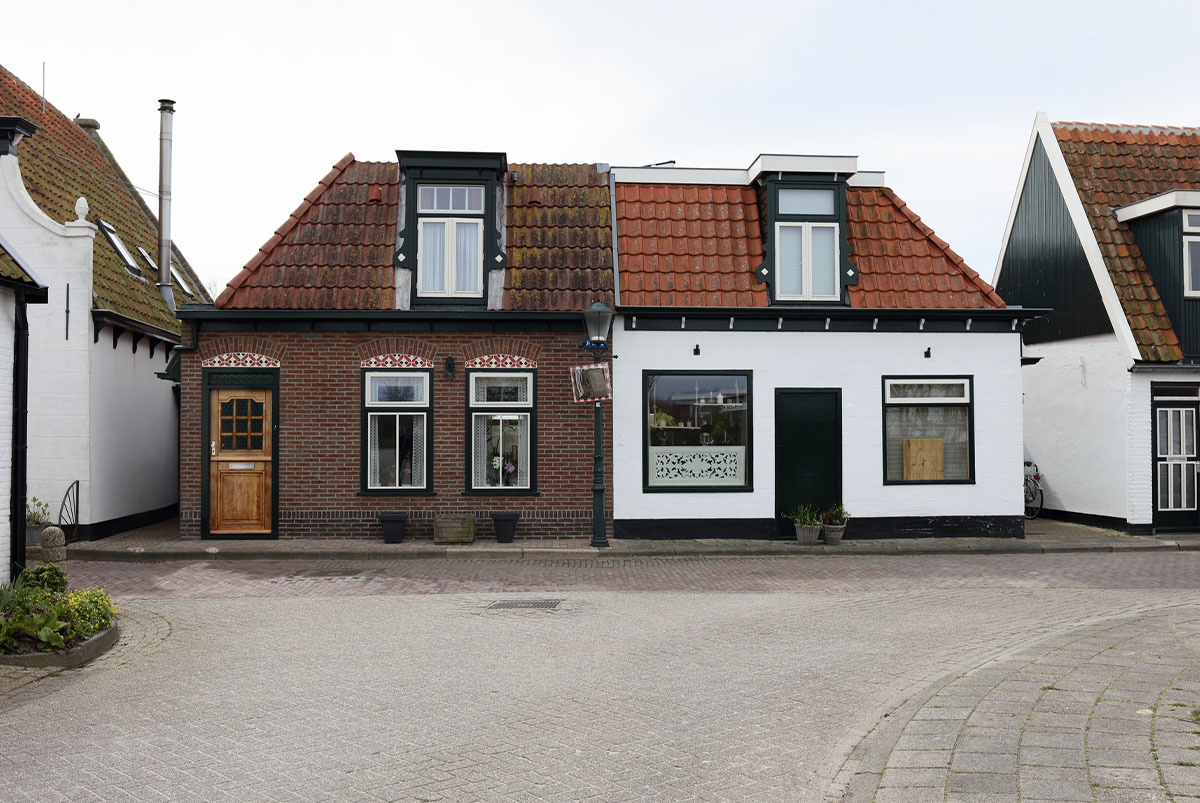Ready To Buy a Home?
Get Approved to Buy a Home
Rocket Mortgage® lets you get to house hunting sooner.
Buying your first home is an exciting milestone, but it can be intimidating. There are so many decisions to make. You have to decide where you want to live, how much you want to spend and what type of home you want (think: a condo or single-family home).
But here’s a question you may not have considered: should you buy a new house or an old house?
Some home buyers get weak in the knees over the personality and charm of a lived-in home, while others want everything in the house to be brand-new – including the owners.
Which home buyer are you? While there is no right or wrong answer to the question, personal preference shouldn’t be the only factor that guides your choice. You should consider both options while you’re home shopping and use our guide to help weigh the pros and cons of newer and older homes.
The Difference Between New Homes and Old Homes
The main differences between new homes and old homes are how the homes were built and their features.
Buyer preferences influence the size and style of new construction over time, leading to larger homes and open floor plans. The median size of new homes built in 2021 was 2,273 square feet — up from 2,033 square feet in 1999.[1]
How new homes are built is also changing in response to improvements in materials, new building codes and new technology. Modern-day building codes prioritize safety but can also encourage energy efficiency and sustainability.
Some changes are saving builders money. For instance, the carved wood designs on staircases or moldings you find in many older houses are practically nonexistent today because of the cost.
How old is old?
Homes built in the last several years are typically referred to as new. In some areas, real estate agents limit the use of “new” to homes that have not been sold. But houses don’t transition straight from new to old. An old home is at least 50 years old, but not over 100.
How do I find out how old my house is?
Unless the paperwork has disappeared, figuring out the age of a property shouldn’t be difficult. Get a copy of the home’s deed from your local tax assessor or county registrar’s office to confirm the year of construction.
Advantages and Disadvantages of Buying an Older Home
Older homes are more likely to be found in better locations. Many of them embody the craftsmanship and charm of a bygone era. But the work can be expensive to maintain or feel outdated.
Here are some common pros and cons of buying an older home:
PROS of Buying an Older Home👍
The home may be close to amenities like markets, entertainment and parks, perhaps within walking distance.
The landscaping and finishing touches are already complete. The trees in the neighborhood may be fully grown.
The home is more likely to be located in a settled, established neighborhood.
Your house is unique. Older homes were typically built to be architecturally distinct from one another.
The home was built to last and may come with solid wood finishes newer homes may not have.
CONS of Buying an Older Home👎
Like the pages in a book, our bodies and cut avocado, aging will take its toll on houses – and some homes are worse for the wear than others. The uniqueness and charm of an older home may come with a few headaches like higher maintenance, repair and replacement costs. The age of features like old windows or poor insulation will add dollar signs to any upgrade.
An older home may have an older sewer, plumbing or electrical system. The breakdown of an older water heater, furnace, air conditioning unit or plumbing system can be costly. Given the age of the home’s systems and appliances, you may want to consider purchasing a home warranty. Sometimes sellers will include a year-long policy as part of the home sale.
Safety may be an issue with older homes. The basement in an older home may not have an outside door or exit or the stair banister may be dangerously wobbly. You should get a home inspection done before purchasing an older home.
Older homes were built for a different time. They likely have small kitchens, bathrooms, bedrooms and closets that are unsuitable for modern living and may prompt a remodel. You may decide to add a coat closet in the entry. Or, to fully enjoy the backyard, you may build a sliding door from the kitchen to the outdoor barbecue pit.
You’ll need to decide whether you want to renovate an old home or purchase a turnkey home. A good house in a good location is probably worth the trouble, but some renovation projects are easier and more cost-effective than others.
Advantages and Disadvantages of Buying a Newer Home
In welcome news, new builds are less likely to contain asbestos or lead-based paint. But some changes aren’t as welcome. Old-fashioned wrap-around porches are rare, and wood-burning fireplaces seem to be on the brink of extinction.
Here are some common pros and cons of buying a newer home:
PROS of Buying a Newer Home👍
Newly constructed homes may cost more upfront but might save you money later on. New homes are generally less expensive to maintain – which makes sense. New materials and new appliances usually mean fewer failures.
Modern features like more insulation and an energy-efficient roof can help reduce your heating and cooling costs. In some areas, many new homes have rooftop solar panels for big savings on electricity bills. Other efficiencies like low-flow water fixtures, dual-pane windows and smart appliances contribute to an energy-efficient home.
Newer homes tend to be larger and have open floor plans. This may mean fewer renovation projects and additions to make the house your dream house.
If you are buying a house that’s under construction, you may be able to influence some of the finishes, like flooring, counters, the home’s exterior color and even the placement of electrical outlets and switches. If you want a say in every decision, you can customize the home by building it from scratch.
CONS of Buying a Newer Home👎
The biggest problem with new construction homes in many cities is location. Cities are populated and, in many cases, overdeveloped. As a result, new housing is usually built outside of cities.
The distance can add time to your commute to work, amenities and services like public transit. A short walk to your favorite cafe may be a thing of the past, and you may spend more time in your car.
New houses typically lack landscaping and character. You may need to make your way to a home supply center or nursery to add flourishes to the property.
Modern homes built in subdivisions often share the same cookie-cutter look, layout and finishes. Identical homes likely won’t work for home buyers who appreciate older craftsmanship or want to stand out from the crowd.
To fit more homes in a subdivision, today’s builders will often sacrifice yard space. You may live very close to the neighbors behind you or on either side of your home.
Old House vs. New House: Which is Right for You?
Well, there is no one-size-fits-all answer to that question.
But if pristine new constructions spark your imagination and passion, they are likely the kind of homes you should consider. Some home buyers want to start from scratch to create the final look and feel of the home. And if you can’t tell your elbow from an elbow wrench, a new house is a safer bet because it’s less likely to need repairs and maintenance.
But maybe there is just something about charming, old-fashioned features that speak to you, or you can’t walk past a fixer-upper without seeing potential. In that case, you may want to consider an older property.
New or Old: There’s No Place Like Home
So are you #TeamNewHouse or #TeamOldHouse?
To decide that, you’ll need to know what you want – and what you can handle. #TeamOldHouse, the lived-in feel and unique architectural flourishes may be accompanied by a lot of wear, tear and repair. #TeamNewHouse, your energy-efficient appliances and open floor plans may add up to higher sale prices and homes that are further from city hubs than you’d like.
Now you know what to consider while you’re home shopping – and knowing is half the battle.
Take the first step toward buying a home.
Get approved. See what you qualify for. Start house hunting.
The Short Version
- Newly constructed homes may cost more upfront but might save you money later on
- Building codes prioritize safety but can also encourage energy efficiency and sustainability
- Buyer preferences influence the size and style of new construction homes over time, leading to larger homes and open floor plans
U.S. Census Bureau. “Characteristics of New Housing.” Retrieved August 2022 from https://www.census.gov/construction/chars/highlights.html




